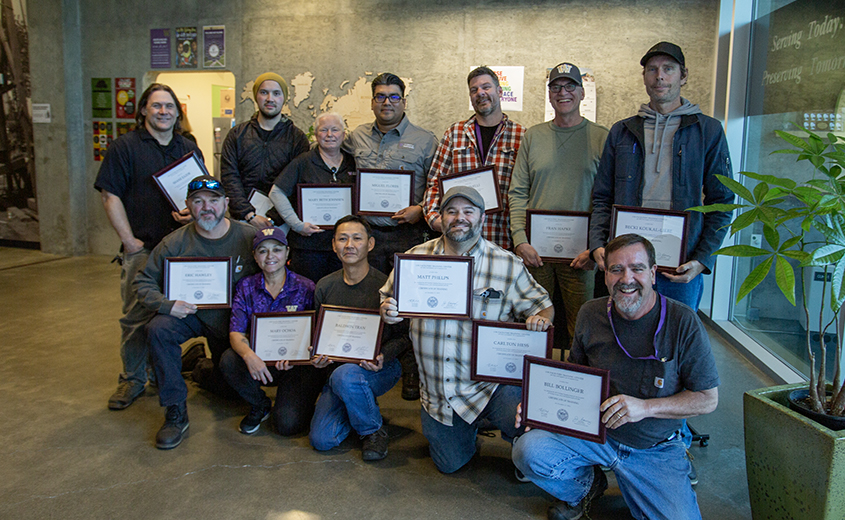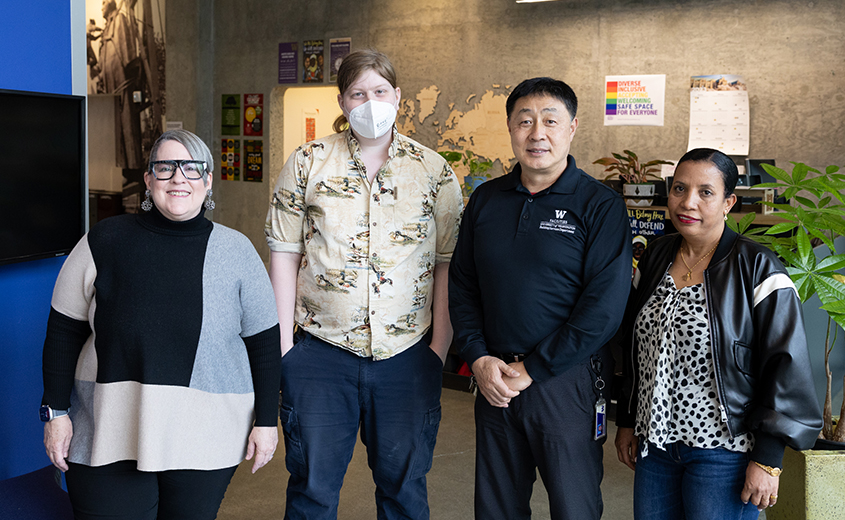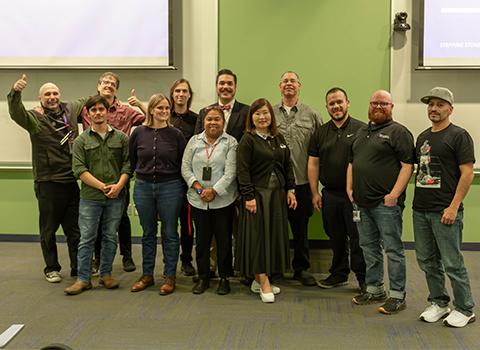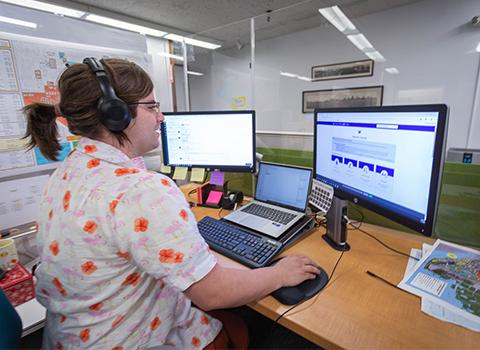Breaking down silos with Stepping Stones

Top row (left to right): Shane Eazor, Tim Bortvedt, Mary Beth Johnson, Miguel Flores, John Finelli, Fran Hapke, Dave Lietske. Bottom row: Eric Hawley, Mary Ochoa, Baldwin Tran, Matt Phelps, Bill Bollinger. Not pictured: Jasean Burke, Carlton Hess, Becki Koukale-Liebe, Han Yoo.
While more than 1,000 people work in UW Facilities, most employees interact with a much smaller set of colleagues in their day-to-day jobs. Mechanics work with other mechanics and custodians with other custodians in their individual areas or shops. Building cross-team awareness is one of the goals of Stepping Stones for Success, UWF’s longtime leadership program for front-line staff.
The nine-month program, which has seen 179 graduates since 2015, consists of weekly sessions on concepts such as empathy and conflict management, lectures from experts across UW Facilities (UWF) and a capstone project by each participant. But it’s not all classroom learning. Job shadowing gives participants the chance to see the leadership skills they’re learning about in action.
By spending 24 to 40 hours following up to eight UWF leaders, front-line staff get to see what life is like in a different department or shop within UWF or in the same department in a different role.
“Job shadowing gave me good information and got me out to see other parts — the whole big thing, not just our shop,” said Bill Bollinger, a refrigeration mechanic lead in Shop 16 of UWF’s Maintenance & Construction (M&C) department. For his capstone, he then went on to work with Building and Infrastructure Systems Manager Jay Dahlstrom of UWF’s Business Innovation and Technology department. Together they worked on building a tool for mapping refrigeration units across campus.
Job shadowing creates an avenue for connection and mentorship. When Mary Ochoa, a sheet metal mechanic in M&C’s Shop 56, spent the day with Dave Horne, a superintendent on M&C’s project management team, something clicked.
“I watched what he did and how he communicated and the measurements he took, and I thought 'I could do that,’” she said. She had thought she might need a college degree to work in that role.
“He gave me the confidence to think that I can do it, where before I didn't know if I could. But I've had experience in the field, I've had experience in the shop, I've had experience in the office as an inputter, so I've done a lot.”
Job shadowing also leads to understanding, appreciation and empathy by allowing participants to literally walk in someone else’s shoes.
“I thought manager was a really easy job, but it’s not,” said Baldwin Tran, a steamfitter in Shop 43 of UWF’s Campus Energy, Utilities & Operations department. “I've never been a manager, so I don't know what they do. They have meetings, a lot of work, and they don't have a break like us. We go home, we don't have worries. They go home, and 24/7/365, they're on call. They have more responsibility.”

Graduates from UWF's Building Services Department. Left to right: Deborah Ann Garrison, John Watson, Daniel Min, Asmeret Measho.
Leadership in action
Leadership in action
Job shadowing gives participants models for how to be a leader. Daniel Min, a custodian in Area C of UWF’s Building Services Department (BSD), wants to be a lead someday. During his shadowing sessions, he watched for those aspects of the job that coincided with the type of lead he wants to be.
“I was always watching how they treat the custodians, you know, how they make custodians happy,” he said. “Because when the custodian is happy, they take care of all the customer care."
Shane Eazor was promoted to sheet metal mechanic lead in M&C’s Shop 56 just before Stepping Stones started in February. He already had the technical skills for the job, but he still found there were skills and knowledge he was missing.
Learning from UWF leaders helped fill the gaps. Working with Amanda Solonika, an associate director in BSD, he learned the nuances of posting jobs and interviewing candidates. Eazor also accompanied BSD Director Jeff Dale as he checked in with custodians out in the field. He observed the way Dale drew on his past experience as a custodian to anticipate the needs of those he managed.
“You learn to not forget where you came from,” Eazor said. “It's the soft skills that you forget you learned, that you're able to rethink. When you're able to take those soft skills that were important to you back then and implement them as you go up the chain, I think that shows a lot of empathy going back towards the staff.”
The people who host job shadowers get a lot out of the experience, too. Eazor also shadowed Brett Magnuson, a portfolio manager with UWF’s Campus Architecture & Planning. As a young engineer 32 years ago, Magnuson would take drawings down to the shops.
“Early in my career I was really dependent upon the shops to help me out,” he said. “And now hopefully on the later end I'm repaying the favor.”
But the effort isn’t all about paying it forward. With each experience, another relationship is formed.
“Each time I go down to the shops, there's another person I can pop in and say ‘hi’ to, and that's when you share information all of a sudden,” Magnuson said.
Stepping Stones expands access
Stepping Stones expands access
Job shadowing is one way that Stepping Stones removes barriers, but next year it will offer another. When the program began it was open to front-line workers in BSD and then to front-line workers in M&C and Campus Energy, Utilities & Operations.
Next year, the program will continue to expand its reach by opening UWF-wide to all non-supervisory staff. Applications for 2024 are available on the UWF’s Partner Resources internal web page and are due by Jan. 5.
“Stepping Stones has been for historically underrepresented groups for professional development,” said Sarah Lewis-Assink, who leads the program. “We know that custodians and trade staff haven't had opportunities, but that's also true for administrators, right? So I think that's why it's important to open it up.”
Opening up the program also helps increase understanding between staff groups, even though there is sometimes a divide, she said.
“From what I've heard from our trade staff, they feel like their work is so hidden and unappreciated,” she said. “Do project managers and administrators feel the same way? They're also behind the scenes and they don't feel appreciated. So if you're sitting in a room together, you might be like, ‘Oh, we all feel the same. Let’s work together.’”
Tran, the steamfitter, agrees it’s important to focus on what employees have in common rather than what divides them, something that Stepping Stones drove home for him.
“Everybody has a different way of thinking and a different way of working. Everybody's different. But we're all here to make it better for the environment at work.”



